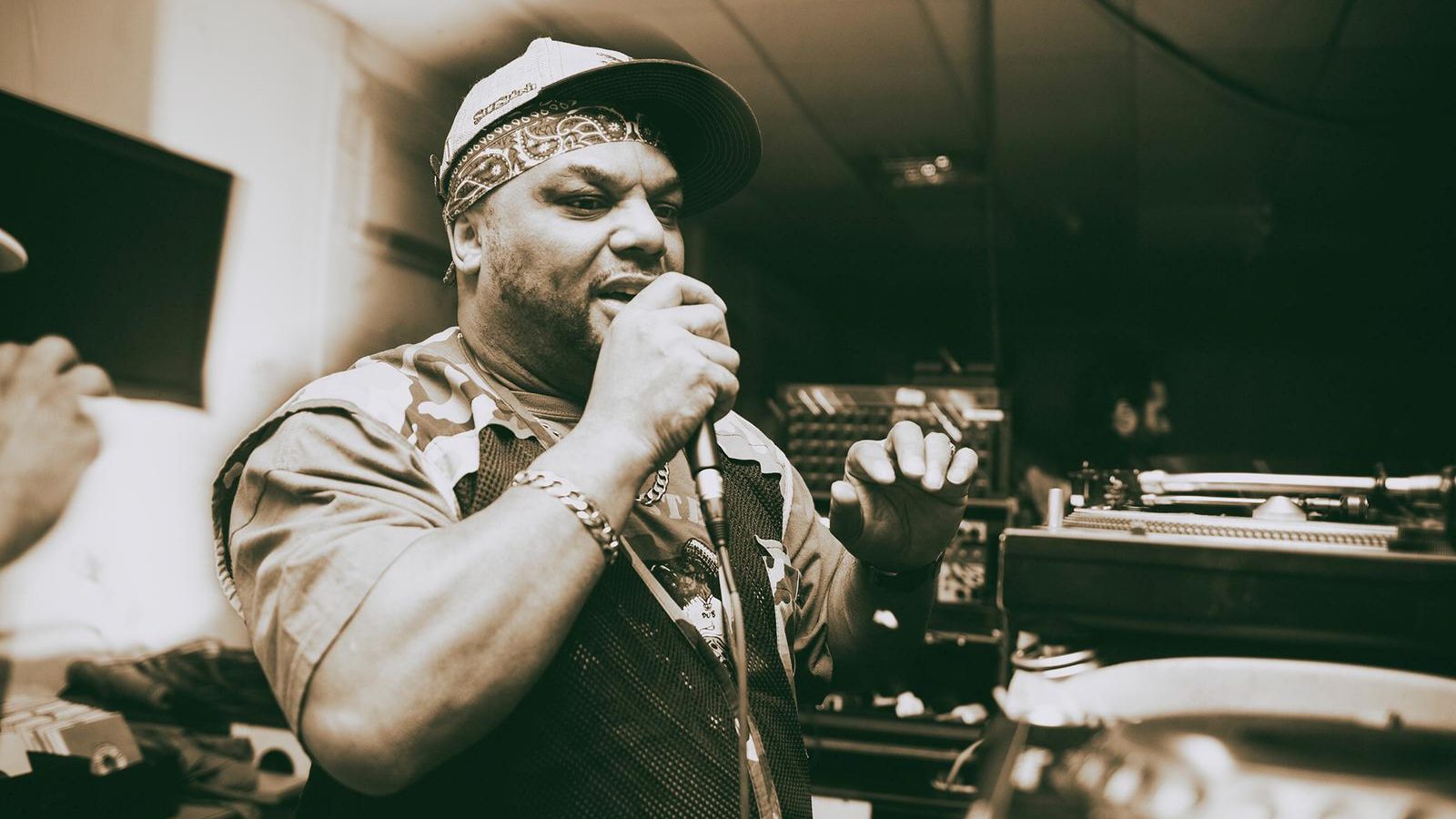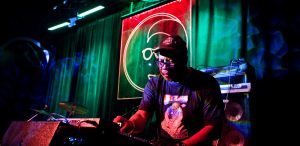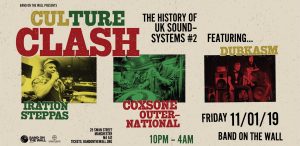More than 25 years have elapsed since the formation of Iration Steppas, during which time, Mark Iration and his close collaborators have helped usher digital technology into the evolving sound system culture. They began in 1990, the same year that Mark released his first Ital Rockers 12”, and having amassed plenty of dubplates and established connections with artists and sounds in various cities, they set to work. Alongside musician Dennis Rootical, Mark forged a new dubwise style of dance production, meanwhile advancing the sound system with the best equipment he could source.
Iration Steppas’ invention in the studio and experimentation in front of the dance made them a truly unique outfit – one whose importance endures to this day, seeing them make a timely appearance at Culture Clash, this Friday night. Ahead of the event, Mark kindly took the time to tell us about his musical influences, including the sounds of his childhood and his early DJ’ing days, as well as the most interesting place music has taken him.
‘I must admit: one of my biggest influences to get me where I am now, was through my education from playing for the youth, back in the eighties,’ Mark explains, his mood excitable as he heads up to Manchester to watch one of the biggest games of the Premier League season so far: Manchester City vs. Liverpool at the Etihad Stadium. ‘That was a big help for me to be where I am now, because the selection I used to play was various, various, various… hip-hop, house, lovers rock, rubadub, dancehall, dubwise, steppas… everything!’
The dances Mark refers to took place at a Bradford youth club known as Checkpoint on Sunday nights, bringing together young people from Bradford, Huddersfield and Leeds. A lifelong fan of Jamaican music, having grown up with the sounds of Prince Buster and Bob Marley amongst others, his introduction to house music had come shortly prior to his experiences at Checkpoint, when in the early days of Ital Rockers, he had invited some friends who were house DJs to join him at a party.
‘Two friends of mine called Mackie and Miller, who were house DJs, I invited them to a party. I did my side of things: reggae, hip-hop and lovers rock… these guys came in and played house music and believe me… you know when music changes your life? The house music changed my life, because this music that they were playing was tough! Marshall Jefferson and stuff like that… acid music, and it changed my life.’
Mark’s newfound appreciation for house music, coupled with his understanding of hip-hop, dub and wide array of other Jamaican styles, led him toward a unique production sound, that makes the original Iration Steppas records of the early nineties highly prized collectables today. ‘Dub was kind of going one direction,’ Mark suggests, ‘so we infused it with strings, different kinds of drums, different kinds of sounds…gave it a more “ethnic” kind of sound than the “traditional” sound. If you heard “Scud Missile” that we released back in the day… “Kilimanjaro” and stuff like that… it’s all influences from stuff that we liked.’
Not only were Iration Steppas crafting a distinctive sound in the studio, they were working on a technologically-advanced setup for their travelling system: one which would see them ‘Playin dubz inna year 3000 style,’ as their original biography puts it. ‘We were the first sound ever to bring [digital] technology into the business and we took a lot of flack for that,’ Mark explains, ‘because back in the day, it was just about vinyl and we changed to a thing called DAT, which was a digital tape. We changed the scene by using DAT instead of dubplates/acetates. It brought a whole heap-a-evolution, a whole heap-a-hassle, and from them days to nowadays, if we didn’t do that, it wouldn’t have changed. We changed it, took the flack for it, and now everybody is enjoying it.’
In addition to the digital playback technology, Mark has kept keenly interested in the evolution of speakers and amplifiers, ensuring that the Iration system packs an almighty punch, while performing to an optimal level. ‘You have to be on top of your game,’ Mark suggests, ‘Nowadays, amplifiers have changed a lot, it has digitised now. You can set them up with a computer to do this and that for the different speakers. You can design your speakers also… it’s not a matter of just plugging it in and playing it now, you can actually read what your speaker is doing, if it’s overperforming or underperforming. It’s mad. The technology is mad!’
‘Technology has opened up doors.’ Mark concludes. It’s seen his sound go from one operating on 100 and 200 watt speakers with numerous amplifiers and acetate dubplates, to 2,000 watt speakers powered by single, multipurpose Powersoft amps, with the benefits of digital audio meaning the dubs cut never degrade.
But when Mark isn’t touring the sound system, he’s equally contented heading out as a DJ. Asked where has been the most interesting place he’s played, where he has felt furthest from home but still comfortable, he answers without hesitation. ‘Japan. Japan is definitely one of my places that I really love going to. I was there last year, I went to the Philippines, Indonesia and Japan, I did a little tour and Japan always does it for me. I don’t know what it is, there’s something about Japan, from the first time I went there which was the late nineties/early two-thousands, there was something that hit me that was mystical and very relaxing. The best way that I can explain it is… it was very influential in the sense that I just felt instantly chilled, I felt relaxed, I didn’t feel like there was pressure about anything. And the people were so kind, the food was good, the venue was wicked, the people were dancing to reggae music, it was a joy to see! Then, the funny thing about it was that when I came back to England and we went to the check-in and baggage, people were hustling and bustling and fighting to get to the counter to get out!’ He laughs. ‘It was like a rough jungle in England, concrete jungle, “grrr, move!” But believe me Japan was like, you’re walking nice and slow, you’re chilled, you’re relaxed, everybody’s relaxed… I told a lot of people about Japan and what it does for you and a lot people had been and had the same experience… if you get chance to go anywhere, go to Japan.’
Despite Japan having left such a great impression, Mark is still very much at home in Leeds. The city home to SubDub and artists such as Danny T, Tradesman, Claston Brooks and others, he’s proud to be part of the scene and to have influenced some of the younger artists within it. ‘Yeh, it’s a good word that ‘proud’, I am proud… I didn’t realise that I influenced a lot of people in that way until they told me. It was Danny T the other day, playing at the New Year’s Eve [party], and he kept saying to me, “it’s your fault, you influenced me,” and all stuff like that, and when I go to different countries people say the same thing: “you influenced me to do this,” so I didn’t realise what I was doing, I was just doing what I felt was right or natural. It’s nice to know that I influenced them to do what they’re doing now. It’s nice to know that Leeds now has got quite a lot of good DJs and engineers, musicians, that make music in their bedrooms or little studios, that Leeds has stepped up that way now… it was like that before but it was mostly house and techno whereas now, there’s a lot dancehall, dub heads and things like that happening so…I ’m proud, yeh.’
Expect to hear Iration Steppas selections over the mighty Band on the Wall sound system this Friday, when Dubkasm, Coxsone Outernational and Iration all head to Swan Street for the second instalment of Culture Clash.




